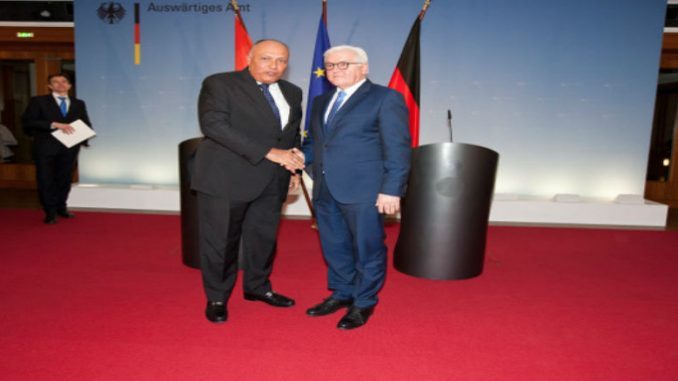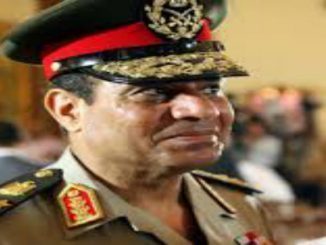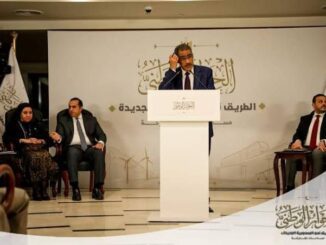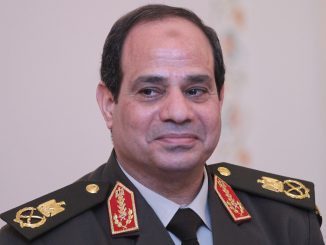
Egypt’s Foreign minister Sameh Shoukry ended his two-day visit to Berlin where he met with German Foreign minister and members of parliament and held interviews with German media.
Shoukry’s meeting with German Foreign Minister Frank-Walter Steinmeier focused on German-Egyptian relations and the areas of conflict in the Middle East.
Shoukry’s visit to Berlin also focused on combating terrorism, illegal migrations, and economic issues.
Combating terrorism and illegal Migrations
“We had long and intensive talks,” Steinmeier said after his meeting with Shoukry. The meeting had taken place at the right time. Looking at the Middle East and North Africa, it was almost an understatement to speak of “turbulent times”, he said.
The two foreign ministers focused on the bilateral relations between the two countries as well as difficult topics such as the Middle East and North Africa. “We had long and intensive talks,” Steinmeier said after his meeting with Shoukry. The meeting had taken place at the right time. Looking at the Middle East and North Africa, it was almost an understatement to speak of “turbulent times”, he said.
In addition to bilateral relations, the agenda also included difficult topics such as the need to combat terrorism.
In the same context, Foreign minister Sameh Shoukry met with German national security adviser Christophe Toniejn.
Egypt’s foreign ministry spokesman Ahmed Abu Zeid said that the talks between Shoukry and Toniejn touched on various aspects of the issues and files that concern the two countries, particularly the situation in the Middle East and various crises.
Abu Zeid added the talks touched on the issue of illegal immigration and its impact on security and stability in Germany and in Europe in general.
Last September, German Chancellor Angela Merkel suggested a deal between the EU and Egypt, along the lines of the pact reached by the bloc and Turkey, to stem the number of refugees trying to enter Europe.
Egypt has become one of the dangerous spots used by migrants to sneak to European borders. Bigger boats are increasingly setting out from Egypt for sea voyages of up to 10 days toward Italy, as the EU, NATO and Turkish coast guard tighten controls in the Aegean Sea after Brussels and Ankara reached a deal to keep refugees in Turkey in exchange for 6 billion euros in aid and eventual visa-free travel for Turks visiting the EU.
Furthermore, FM Sameh Shoukry met with Germany’s Minister of Interior Thomas De Maizière where they discussed efforts to combat terrorism and the cooperation between Egypt and Germany in this field.
In addition, Shoukry’s meeting also touched upon aviation security and the efforts of Egypt to secure its airports, according to Ahmed Abu Zeid.
Shoukry and De Maizière also discussed the role of Islamic institutions in Egypt to combat extremism. Maiziere expressed Germany’s eagerness to cooperate with these institutions to spread the concepts of Islamic moderation in Germany.
Freedom and Human Rights
In the same context, both foreign ministers also talked about the importance of fundamental freedoms and human rights.
In addition, German’s Foreign Minister also addressed the question of German political foundations being able to start working in Egypt again.
After the talks, Foreign Minister Steinmeier expressed hope that a solution could soon be found in order to enable the political foundations to restart their work.
In return, regarding Shoukry replied that there are about 48,000 national NGOs in Egypt and about 200 foreign organizations that are currently operating.
In fact, since Abdel Fattah al-Sisi reached power by a military coup against Egypt’s first democratically-elected President Mohamed Morsi in 2013, his regime has launched a massive crackdown against NGOs, political opposition, lawyers, journalists and trade Unions. In addition, the Egyptian authorities have killed more than 1,000 people and jailed some 40,000.
Back in 2011, when al-Sisi was a member of the Supreme Council of the Armed Forces (SCAF) that ruled the transitional period after the fall of Mubarak regime, the Egyptian authorities raided NGOs offices which was described as a “smear campaign” orchestrated to silence critics of the military rule under the pretext of protecting Egyptian sovereignty from foreign interference.
Accordingly, when al-Sisi seized power his military regime adopted a comprehensive policy to silence the NGOs and human rights organizations.
On September 17, Cairo Criminal Court issued a ruling that freeze the assets of three groups, as well as the personal funds of five human rights defenders, as part of an investigation into their foreign funding.
In response, Human Rights Watch has released a report warning that the most prominent human rights organizations existence in Egypt has become at risk after the court’s ruling.
Regional conflicts
Moreover, Shoukry and Steinmeier discussed the areas of conflict in the region.
Steinmeier said, “There is great upheaval in the region, and a significant amount of order has been lost.” He added,” The various areas of conflict posed risks and threats to the entire region, not least to Egypt.”
Both foreign ministers focused on the situation in Libya, Egypt’s neighboring country to the west. Steinmeier said that despite all endeavors, Libya was “still a long way from national unity and state stability.”
He also added paid tribute to efforts made by Egypt, which has recently played an active role in attempts to bring about a political settlement.
In the same context, the talks tackled the situation in Syria that Steinmeier described as “terrible”.
“A political settlement was still a long way off. Although fighting had become less intense in parts of the country, the international aid organizations were still experiencing difficulties in providing the urgently needed humanitarian assistance. In the hard winter months, people needed humanitarian care all the more urgently,” he added.
Regarding Middle East conflict, Steinmeier said it was essential to “work resolutely to preserve the chance of peace in the region”.
He underlined once again that this chance of peace can only exist in the form of a two-state solution ‑ if security is ensured for Israelis and Palestinians, and two states can live peacefully side by side as neighbor’s.
Steinmeier said that Egypt had a key role in the peace process and carried particular weight in the Arab world.
The Economic Issues
In the same context, FM Sameh Shoukry met with Minister for Economic Affairs and Energy Sigmar Gabriel.
Shoukry also met with the German Minister of Transport and Digital Infrastructure Alexander Dobrindt, minister for Economic Cooperation and Development Gerd Muller, parliamentary group leader of the ruling CDU/CSU faction Volker Kauder, and Vice President of the Bundestag Edelgard Bulmahn.
Moreover, Shoukry discussed with his German counterpart Frank-Walter Steinmeier Egypt’s its economic reform program and its importance in enhancing the economic situation in Egypt.
Shoukry also demanded that Germany support Egypt during its economic challenges.
Egypt has taken extreme measures recently to revive its wrecked economy that undergoes one of its harshest crisis in its history as the economic conditions has deteriorated in an unprecedented way under his al-Sisi’s rule.
Tourism and foreign investments, the two sources for foreign currency, have declined as a result of political instability and lack of security.
The withdrawal of the two main sources of foreign currency led to a severe shortage in foreign currency. As a result, the Egyptian pound rate has fallen compared to the US dollar and the black market flourished on the currency expense and led to inflation.
Last November, the International Monetary Fund’s executive board approved Egypt’s request to secure $12 billion loan facility after Egypt met its requirements.
On August 30 Egypt started its first steps towards the loan when Egypt’s parliament approved a long-awaited law introducing a value-added tax (VAT) of 13 %, rising to 14% in the next fiscal year.
On November 3, the Central Bank of Egypt floated the Egyptian pound and gave up trying to peg the currency to the US dollar allowing it to devalue by almost half.
On November 4, Egypt took another unprecedented decision, which has always been abandoned by former leaders in fear of public unrest, to cut subsidies for fuel leading to jump in prices.
However, despite taking all these drastic steps, the IMF loan alone won’t help as the North African country still needs to revive its internal sources as foreign investments to allow the flow of foreign currency within the country and thus, stabilizes its currency and contains its inflation rate.
Shoukry’s Interviews with the German Media
Egypt’s foreign affairs minister Sameh Shoukry said in an interview with Deutsche Presse-Agentur (DPA) that extremist and terrorist groups view Egypt as a “grand prize.”
Minister Sameh Shoukry told DPA that “Egypt and its people have always been targeted by terrorist groups in an attempt to divert [the country] from its [right] path, which would never happen.”
Shoukry stated,“Egypt has always been a beacon for culture and thought in the Middle East, which is something that terrorists aim to destroy.”
He added,“Egypt is fighting terrorism to protect the world as well as maintain security and stability in the region and on the international level.”
Regarding Syria, Shoukry said Egypt would not get involved in any military intervention in that country, dismissing claims that any such intervention could solve the Syrian crisis.
He stated that Egypt maintains the same stance it adopted over two years ago that “honorable, trusted” Syrians should be tasked with building the country’s future.
Shoukry added,“I believe that if many [concerned] parties listened to the wise stance we adopted at that time, Syria would have been spared much of the destruction, and casualties would have been less.“
However, Bashar al-Assad of Syria revealed in an interview with al-Watan,a Syrian newspaper last December,that the Egyptian-Syrian relations is improving, adding that the relations have been limited only to “military cooperation so far.”
Moreover, there were recent media reports that claimed that an Egyptian unit, including 18 Egyptian pilots started to work at Hamah military airbase in Syria on November 22, as reported by al-Safir-a Lebanese newspaper close to the Shiite militant group Hezbollah.
18 pilots were part of a special helicopter squadron operating at Hamah airbase and have been at the base since 12 November, according to the same source.
It is not known if the pilots have already participated in airstrikes or not, but their presence at Hamah airbase shows that there is an Egyptian-Syrian decision to speed up merging the Egyptian pilots.
Arab sources were quoted saying that Cairo is also studying dispatching its ‘Thunder Forces’ to Syria to help the army more extensively in operations.
It also quoted senior Syrian security sources as saying that the Egyptians have promised Damascus to send their forces to Syria and will start massive participation in battles there on January 23, adding that Cairo’s military presence will go beyond its role in Hama airbase.
The Egyptian-German Relations
Last week and in the wake of Shoukry’s visit to Berlin, al-Sisi and German Chancellor Angela Merkel discussed via phone call bilateral relations between the two countries as well as recent regional and international developments.
In the same context, al-Sisi and Merkel affirmed their countries’ solidarity in combating terrorism.
The call also included a discussion on the “special bilateral relations” between Egypt and Germany, as well as the two countries’ wish to further their cooperation in all aspects, particularly with Merkel’s scheduled visit to Egypt in the first quarter of 2017.
Since 2014, Germany and Egypt have been working on a security cooperation agreement. Many German officials have visited Egypt last year.
German Interior Minister Thomas de Maiziere has met with his Egyptian counterpart Magdy Abdel Ghaffar multiple times last year.
Maiziere has called Egypt an “indispensable ally in the fight against terrorism and illegal immigration.”
During the visit at the end of March, Maiziere discussed ways to enhance cooperation in areas such as security, counter-terrorism, airport security, and immigration.
Moreover, German vice-chancellor and minister of economic affairs Sigmar Gabriel announced that potential arms deal with Egypt during a press conference held in Cairo in April 2016.
Gabriel said at the press conference that “The Egyptian government did not ask Germany for a weapons deal during this visit, but there was a discussion about supplying two naval submarines. We are ready to fully cooperate with Egypt to secure its borders with Libya.”
In this context, Egypt and Germany have signed a number of security cooperation agreements last July.
The agreements address a number of areas, including illegal immigration, counter-terrorism, and securing airports.
In this context, Egypt’s Minister of Interior Abdel Ghaffar signed an intelligence-sharing agreement, an extradition agreement including Interpol Red Notice warrants and an agreement that would see Germany train Egyptian security personnel to investigate financial crimes.
Germany announced a naval submarine deal with Egypt in 2012. Under the initial terms of the agreement, Germany would export four state-of-the-art military submarines to Egypt.
Last December, Germany handed over the first two submarines to Egypt.
Despite human rights violations under the al-Sisi regime, Germany as well as other European countries continue to arm Egypt’s al-Sisi.
In May 2016, Amnesty International report condemned EU member states for supplying arms and equipment to Egypt despite the wave of unlawful killings, enforced disappearances and torture in the North African country, as reported by Amnesty.
The report said that despite the EU suspension on arms transfers to Egypt, almost half of European Union (EU) member states have violated the sanctions.
The report reads,” After hundreds of protesters were killed in a show of grossly excessive force by security forces in August 2013, 12 out of 28 EU member states have remained among Egypt’s main suppliers of arms and policing equipment. It is feared that EU Foreign Ministers could soon decide to scrap the current, already insufficient, suspension.”
According to Amnesty’s report, EU states authorized 290 licenses for military equipment to Egypt, totaling more than €6 billion (US$6.77) in 2014 alone. The items have included: small arms, light weapons and ammunition; armored vehicles; military helicopters; heavier weapons for use in counter-terrorism and military operations; and surveillance technology.
The EU countries who have been supplying arms to Egypt through exports or brokering since 2013 are: Bulgaria, Cyprus, Czech Republic, France, Germany, Hungary, Italy, Poland, Romania, Slovakia, Spain and the UK.
According to Privacy International, the Egyptian authorities were also supplied by companies from several EU countries, including Germany, Italy and UK, with sophisticated equipment or technologies destined for use in state surveillance, which Amnesty International fears may be used to suppress peaceful dissent and violate the right to privacy.
Al-Sisi military regime has engaged in one of the widest arrest campaigns in the country’s modern history, targeting a broad spectrum of political opponents.
According to Human Rights Watch and local rights groups, “Between June 2013 and May 2014, the Egyptian authorities arrested or charged at least 41,000 people, and 26,000 more may have been arrested since the beginning of 2015.”Enforced disappearance, arbitrary detention, military trials, and human rights violations at Egypt’s prisons have marked al Sisi’s reign.



